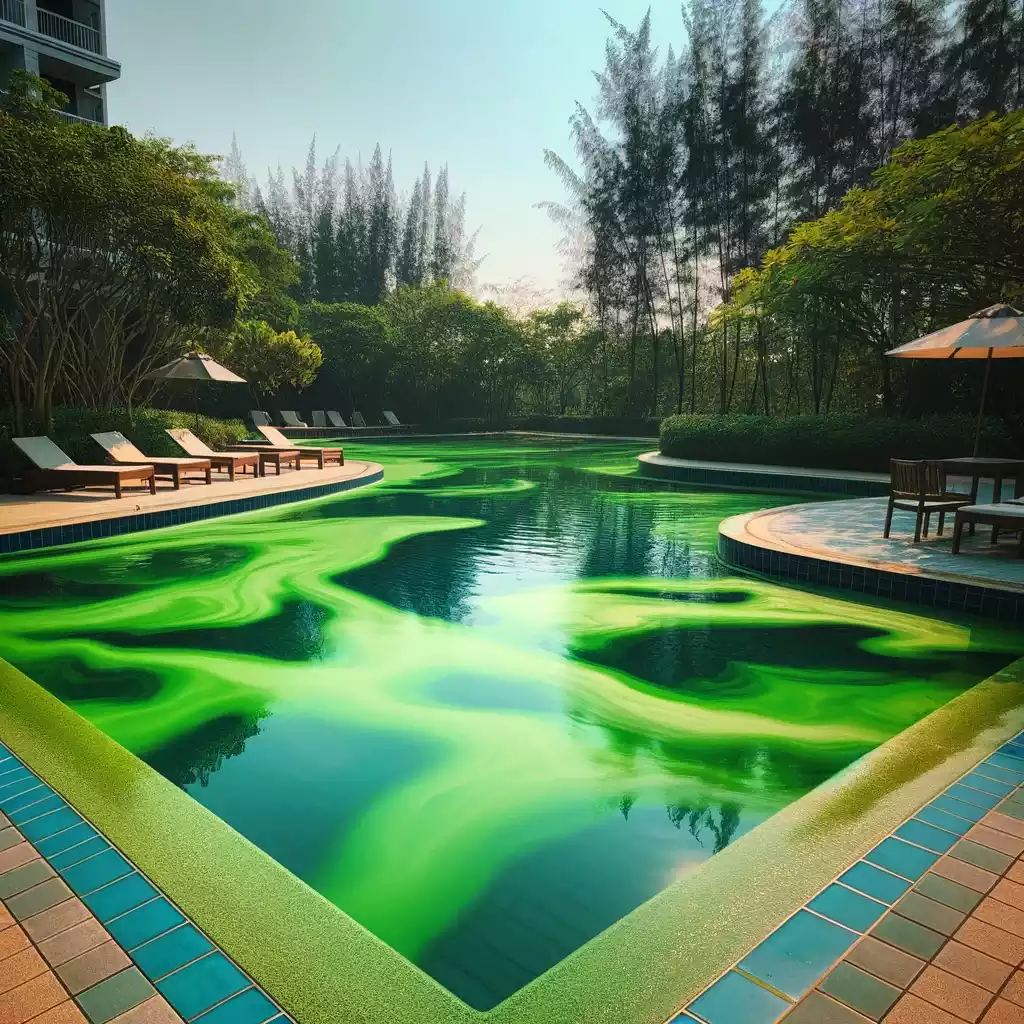The water quality issue in swimming pools has always been a challenging problem, and one common occurrence is the presence of green floating substances in the water. This not only affects the aesthetic appeal of the pool but may also have adverse effects on the health of swimmers. Therefore, addressing the issue of green floating substances in pool water becomes particularly important.

Reasons for the Presence of Algae in Swimming Pools
The appearance of green floating substances in swimming pools is typically attributed to the presence of algae. Algae are microscopic plants that thrive and reproduce rapidly under certain conditions. The green color is a result of chlorophyll in the algae, the same pigment responsible for the green color in plants.
Several factors contribute to the growth of algae in swimming pools:
- Sunlight Exposure: Algae require sunlight for photosynthesis. Prolonged exposure to sunlight without proper chemical balance in the pool creates an environment conducive to algae growth.
- Poor Water Circulation: Inadequate water circulation allows algae to settle and reproduce in stagnant areas of the pool. If the pool’s filtration system is not functioning properly, insufficient circulation may occur.
- Chemical Imbalance: Improper chemical balance, especially low chlorine levels, can lead to algae growth. Chlorine, a common pool disinfectant, helps prevent the development of algae and other microorganisms.
- Organic Contaminants: The presence of organic matter, such as leaves, debris, or body oils from swimmers, provides nutrients for algae. Regular removal of these contaminants is crucial to prevent algae growth.
How to Address Green Floating Substances
To prevent and address the issue of green floating substances in swimming pool water, it is essential to:
- Increase Copper Sulfate Agents:
- Problem Description: The text suggests considering an appropriate increase in copper sulfate agents to address water quality treatment issues.
- Solution: Copper sulfate is an algaecide used to inhibit the growth of algae. Increasing copper sulfate agents aims to address potential algae problems and maintain water cleanliness.
- Water Quality Treatment Requirements:
- City Tap Water Treatment: Recommends using refined aluminum sulfate instead of alum to improve water treatment effectiveness.
- New Water Injection Ratio: Daily injection of a certain proportion of new water is necessary to maintain water stability. Even with the use of copper sulfate and other agents, attention to new water supplementation is crucial.
- Advantages of Full Water Pools: Full water pools utilize a balance tank to control water levels, regularly overflowing surface water to prevent green water and algae growth on pool walls.
- Disinfectant Selection: Emphasizes using mature and simple processes for pool disinfection to ensure hygienic water quality.
- Water Circulation System: The water treatment circulation system should maintain a certain flow rate to enhance filtration and prevent dead zones, improving heating efficiency.
- Swimming Pool Water Purification:
- Filter System: Use a sand tank filter (quartz sand particle size 0.8~1mm) to filter water.
- Use of Medication Pumps with Different Agents:
- Coagulant: Use polyaluminum chloride to promote the settling of impurities in water, enhancing filtration.
- Disinfectant: Use sodium dichloroisocyanurate or slow-release chlorine tablets to kill bacteria, ensuring swimmers’ hygiene.
- Algaecide: Use copper sulfate to inhibit algae growth, intermittently adding.
- Acid-Base Agent: Use sodium hydroxide or hydrochloric acid to adjust the acidity of pool water, intermittently adding.
- Number of Medication Pumps: Use three medication pumps – one for disinfectant, one for coagulant, and an additional one for algaecide or acid-base balancing agent as needed.
By following these water treatment requirements and utilizing medication pumps with different agents, the issue of green floating substances in swimming pool water can be effectively addressed. This ensures clean and safe water quality, providing a pleasant swimming environment.
In conclusion, maintaining clean pool water is not only a necessary task but also a key factor in ensuring the safety and enjoyment of swimmers. Regular checks, proper chemical additions, and enhanced filtration system maintenance are effective measures for maintaining pool water quality. By implementing these measures, we can ensure crystal-clear pool water and provide a safe, healthy, and enjoyable swimming environment.

 Instant
Quote
Instant
Quote Email
Us
Email
Us